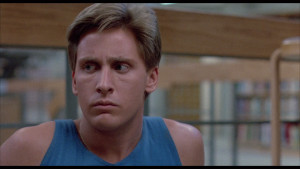Cloning kids. It seemed like every other movie about teens in the 1980s and 1990s decried it. Not the actual biological cloning, but that spiritual cloning attempted by overbearing parents. The coach of the bad sports team, typically, pushing his own child into something he didn’t like when all he wanted to be was a dancer, or something. Emilio Estevez in The Breakfast Club springs to mind immediately. Or maybe its the soulless corporate business types who want their kids to go to Harvard so badly. I remember reading a short story in high school (can’t remember the name of it for the life of me) about a rich kid riding to his first day of school at a prestigious prep academy in New England somewhere, a place where he’d actually failed the entrance exam and couldn’t tell his father (a distinguished alumnus) because of the pressure from his old man.
 I’m sure he probably just wanted to be a dancer or a painter or something.
I’m sure he probably just wanted to be a dancer or a painter or something.
As I’m raising my kids, I’ve been taking a strange comfort in knowing I’m not like that; I’m not rich, I was never an athlete, and while I went to war–well, like a lot of people who have gone to war, the last thing I want is for my children to do it. I went to a prestigious prep school and I want nothing of the same for my kids. So I’m doing alright, yeah? My kids are going to grow up to be eclectic nerds, just like me.
Ooh, hang on a second.
Just like me? Hm.
There’s this question that floats around sometimes among nerd-parents: When do you show them the Star Wars movies? What order do you show them in? How old should they be? How old were you when you saw them? Isn’t that a good rule of thumb?
What those questions are really getting at is this: How do I best replicate my experience with Star Wars, such that it impacts my kids in the same way? How do I clone my feelings for this great thing into their brains? Because, oh those feelings! Oh that joy! The anticipation, the glee, the sheer delight with which I approached those movies. It was wondrous, transforming, life-affirming, transcendent. It was so awesome, and I want my kids to have that too! How could I not?
I was thinking about this particularly with regards to The Princess Bride. Seeing that movie had a fairly profound effect on me, though one I can’t really put into words. And so, without really understanding what it was about the movie that had so touched me, I was wondering if I could introduce it to my kids in such a way that it would touch them, too. But then, I realized that part of what I most loved about The Princess Bride was not the movie itself (though it is great, transcendent, life-affirming, etc.), but the point at which I discovered it, and how I discovered it.
I remember the how so clearly: late night, on the little TV in the other room while the whole family was watching some treacly Disney goop, I stumbled on this movie with Andre the Giant. And… a guy with a sword, no two of them, and a beautiful princess, and… and… And it was wonderful. It was a true discovery such that I hadn’t made for myself yet, or hadn’t made often. Most of my cultural intake had been force-fed, or carefully curated. It was much the same with Douglas Adams (again, truly great, no question)–it wasn’t some hallowed member of a canon that I had been gifted with, it was just some battered paperback in the school library. Catholic school, no less.
I know, right? That’s part of what made that discovery so incredible, so dramatic and wonderful. It didn’t really matter whether I was early or late to that particular party, but I had made it to the party, I had found my own way there. I had found it through a very, very unlikely path.
And the temptation is so incredibly strong to try to guide my kids along that same path of discovery. I look at some of the things they watch and read, and I can’t imagine how it could possibly stack up to what I watched and read at their age. Star Wars! Douglas Adams! Star Trek! Isaac Asimov! So it’s my duty, to make sure they get that stuff, otherwise I’m a bad geek parent. I have to indoctrinate them, I have to make sure they do these things, and read and watch, no matter how much they don’t like it, or…
So suddenly, I see those awful, overbearing Dads in a much more sympathetic light. Not that they were doing the right thing, they certainly weren’t. But now I understand. They had become good and respected men, or at least saw themselves that way, and they wanted that same thing. Or maybe they genuinely found joy in the struggle of athletics or business or war. And they wanted that for their kids, in part perhaps because they couldn’t imagine kids being happy doing something else, in part because they saw it as a way to security and the good life.
What I’m finding now is that I’m trying to take joy in seeing my kids develop on their own, to make their own discoveries. A few months ago, my 7 year old daughter bought a 300 page book from her school book fair. It’s not a book I would ever have picked for her. But we let her buy it, and read it (to the point that she was up super late a few nights), because it… was hers. Her discovery, her joy. And I’m trying to remember that those feelings are far more important than whatever feelings might be inherent to watching Star Wars or The Princess Bride.
Bottom line, it’s not a bad thing to want my kids to have the same kinds of experiences, to find the joy that I found, that sustained me in hard times. Just as it’s not a bad thing to want to instill similar values in my kids, or to find common ground with them. It is all, of course, how I go about it, how I get there, and how much I worry about it.

